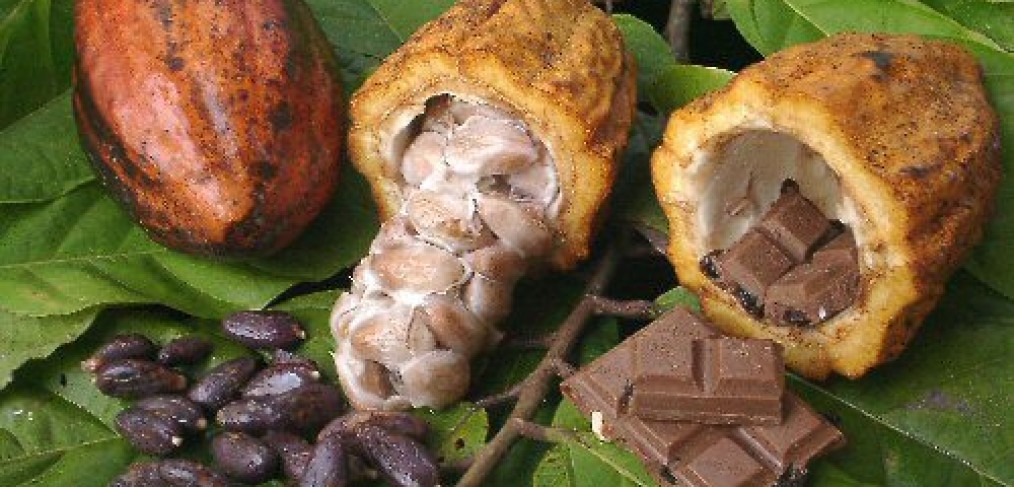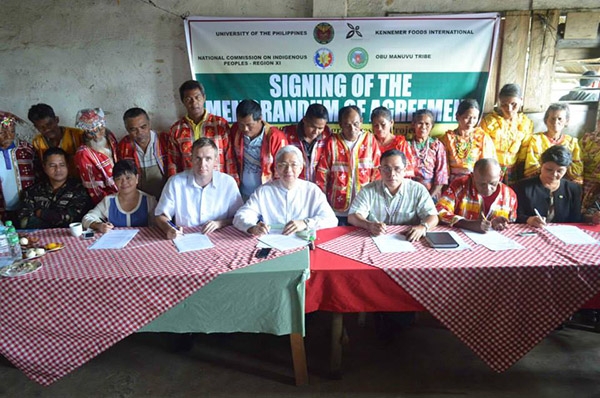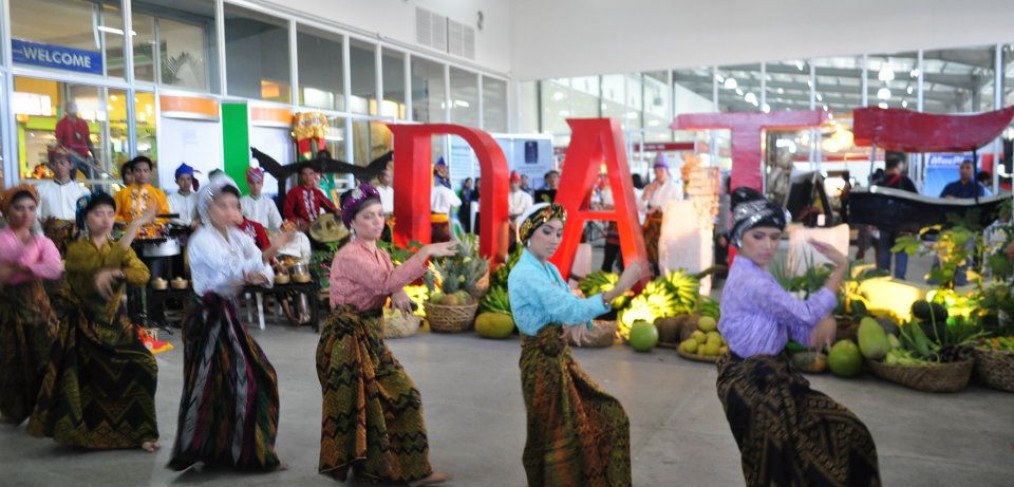Source: Minda News
DAVAO CITY (MindaNews/03 October) – The City Agriculture Office is tapping small farmers rather than large-scale plantations in the city’s bid to become the country’s top cacao producer.
Leonardo Avila III, City Agriculture Office chief, said there might be no need for the large-scale plantations because cacao can be planted along with other high-value crops or integrated in farms that are already planted to coconut, coffee and durian.
The city’s cacao development program started in October last year and aims to plant at least 1,000 hectares a year.
“We are continuously educating small farmers, conducting trainings and nurturing cacao seedlings in our nursery,” Avila said, adding the growing demand in the local and world markets pushed the city government to promote cacao among small farmers.
A worker wraps cellophane over newly-grafted cacao seedlings at the Cocoa Foundation of the Philippines’ Cacao Agribusiness Zone Center in Talandang, Tugbok District, Davao City on Thursday, Sept. 29, 2011. The Davao City Agriculture Office is encouraging farmers to intercrop cacao between coconut trees, fruit trees and other crops to help increase farmers’ income. MindaNews Photo by Ruby Thursday MoreHe noted that the US and Europe are the leading markets for cacao.
He cited that the city’s terrain and climatic condition are suitable for the crop.
“Not everyone likes to eat durian while cacao has a potential market here and abroad. Everybody wants to eat chocolate and the consumption is growing,” he added.
Data at the World Cocoa Foundation website showed that chocolate product consumption has been growing at around 3% per annum. From 5.5 million tons in 2001, it rose to 6.5 million tons last year.
Marilyn Carubio, Cocoa Foundation of the Philippines Technical Adviser for Mindanao, said the country produces 6,000 tons of cocoa a year about 80 percent of which is from Davao Region.
Carubio said that the production in the Davao region, particularly in the city, will increase in the coming years given the persistent advocacy of the city government.
The price range of dried cacao beans is at P100 to 125 per kilo while wet beans cost P28 to P32 per kilo in the local market.
Marilyn Carubio, Technical Adviser of the Cocoa Foundation of the Philippines’ Cacao Agribusiness Zone Center checks on the cacao fruits in Talandang, Tugbok District, Davao City on Thursday, September 29, 2011. She said a single cacao tree can yield 1.5 to 2 kilograms of dry beans per harvest which can be sold at P125 a kilo. An hectare of land can be planted with up to 1000 cacao trees. MindaNews Photo by Ruby Thursday MoreWith the opening of the Cacao Agribusiness Zone Center in Barangay Talandang in Tugbok District, Carubio hopes that more farmers will now engage in cacao farming.
The facility, which opened in January this year, has 24-ton capacity fermentation boxes, sets of solar dryers and hybrid (artificial and solar) dryers, a central nursery, budwood garden, and a training hall.
“We are offering a free training to the farmers and we are the ones who will come to the barangays or we can also conduct it here in the center,” she said in an interview.
Dario Divino, CAO’s industrial crops specialist, cited the areas of Calinan, Marilog, Paquibato, Toril and Tugbok districts as suitable for cacao farming.
“If a farmer has an hectare of coconut trees, let’s say if he can insert about 900 cacao trees, that’s an additional income already. That’s at least P150,000 of extra income already,” Divino said in an interview.
He added that a cacao tree can yield around 1.5 to two kilos of dried beans or around a ton of dried cacao beans per hectare.
Interested investor
Upon seeing the potentials of the city in cacao production, a Manila-based food company sent a letter to Mayor Sara Duterte expressing their interest to invest in cacao industry.
In a letter dated September 8, 2011, Simon Bakker, president of the Kennemer Foods International Inc., said: “The world production of cocoa is at 3 million metric tons, but this will likely increase to 4.8 MT by 2015 because more people are eating chocolates because of its nutritive and cancer-fighting capabilities (based on a study by Global Industry Analysts, Inc.).”
To realize the city’s potential as a key producer and processor of cocoa beans, Bakker proposed that they would lease a 4.5-hectare land in Calinan to serve as the site of our central processing facility and operational headquarters.
“To entice farmers to plant cocoa by providing them long-term growing contracts and financing, assure the farmers with a buy-back of their cocoa harvest at competitive price linked to the cocoa terminal markets in London and New York and develop 10,000 hectares for cocoa in Davao City,” he said in the letter.
He said the contract-growing package will include the provision of seedlings, inputs, training and assistance with farm and crop management. “To make all of these possible, we intend to invest P100 million in nursery and post-harvest facilities alone for this project,” the letter concluded.
Avila said if this proposal materializes, it will surely benefit more farmers who are willing to venture into cocoa farming. “The common problem among our farmers is the capital and the market. I think this proposal can help solve the puzzle.”
Low-maintenance crop
As part of developing agroforestry program of the city, Avila said they have chosen cacao since it is a low-maintenance crop.
He added that through the Sustainable Agroforestry for Rural Upland Communities, it can help conserve the city’s watersheds as well as alleviate poverty.
Divino shared the same views saying that unlike mango, cacao is not a high-maintenance crop that requires a lot of chemicals to be able to produce high yields.
“Cacao can thrive anywhere, it can adopt in our climate. It doesn’t require a lot of maintenance. Look at the farmers in very remote areas. They can still produce good harvest of cacao without using any chemical or synthetic fertilizers. But for mangoes, you need to spend a lot of money in spraying chemicals to have a good harvest,” explained Divino, who used to work as supervisor of a plantation.
For Carubio, she considers cacao as a “friendly crop” since even the women can work in the cacao farm. “Even the kids can harvest the fruits because the tree is not really tall. The women can help in pruning.”
Divino, meanwhile, added that this is the reason CAO is focusing on small farmers because they can easily adapt to the technology.
“The problem with plantations is that, if the owners change their mind and they want to plant another crop, you have to cut down the cacaos. This is what happened in our company before,” the agriculturist added.
Vast agricultural land
Meanwhile, Avila said the city has a total of 162, 000 hectares of agricultural land 105, 000 of which is intended for agroforestry development.
Aside from cacao, crops like cassava, coffee, coconut, durian and rubber are also being eyed to be promoted under the agroforestry program, he said.
As of June 10 this year, data from CAO showed that cacao farms have reached 1, 139 hectares. These are in Calinan, Baguio, Tugbok, Toril, Paquibato and Marilog districts.
Avila said these are also the same areas they are eyeing for agroforestry development.
The data showed that on top of the list is coconut with 16,000 hectares followed by corn (8,328 has), Cavendish banana (6,411 has), mango (4,133 has), durian (3,462 has), Lakatan banana (2,034 has), pineapple (1,706 has.) tundan banana (1,341 has), rice (1,310 has.), and then cacao.
As part of the program, Avila said the city is now maintaining a five-hectare central nursery in Malagos district and eight satellite nurseries spread out in the barangays within the five watersheds of Davao River, Lasang, Talomo, Lipadas and Sibulan. (Keith Bacongco/MindaNews)
Read more http://www.mindanews.com/top-stories/2011/10/03/davao-taps-small-farmers-in-bid-to-become-ph%e2%80%99s-top-cacao-producer/



